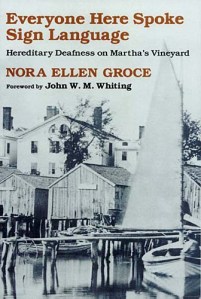A tale of two acents

Map of Martha’s Vineyard. Source: Labov (1963) |
Martha’s Vineyard is an island off the Massachusetts coast SW of Cape Cod, and a popular resort for Bostonians. The permanent population are famous in various ways. Until not so very long ago their Great Vowel Shift hadn’t got further than [əi] and [əu] for PRICE and MOUTH respectively. The islanders were studied by William Labov for his research on how sound change can be related to social factors (1963, The social motivation of sound change, Word 19, 273-309). While reading that article in the 1960s I realized I was listening to my grandfather’s voice speaking the transcriptions. I can’t recall his voice or accent today, but I could then, or perhaps subconsciously, or maybe I deceived myself. I was born on the Isle of Sheppey (Kent UK), and I knew I spoke Estuary English, a teacher had told us that at school in the 1950s. My parents were born in 1907 and 1909, they grew up on Sheppey, and they spoke Estuary English too. But grandfather, born in 1880 near Faversham (Kent UK), didn’t. Nor had he ever crossed the Atlantic to Martha’s Vineyard, and he’d almost certainly never even heard of it. But it seemed perfectly natural to put his voice to Labov’s transcriptions.
 A plausible explanation turned up about 30 years later. I bought a book to read on a long journey home, thinking I might learn something about sign language. Nora Groce, 1985, Everyone Here Spoke Sign Language, Harvard University Press. I certainly did learn something about sign language, but it was above all a fascinating study of congenital deafness on Martha’s Vineyard, including the author’s own family. She traced the mutant gene back to some of the original settlers, a group of Puritans who emigrated from the Weald of Kent and the area around Ashford and Wye in the 17th century, bringing the gene with them. They also took along the FOOT-STRUT split, but not the TRAP-BATH split that developed in Kent after they left. They would also have taken along [ɛʉ] for MOUTH. Labov, tracing the speech of the settlers, noted
A plausible explanation turned up about 30 years later. I bought a book to read on a long journey home, thinking I might learn something about sign language. Nora Groce, 1985, Everyone Here Spoke Sign Language, Harvard University Press. I certainly did learn something about sign language, but it was above all a fascinating study of congenital deafness on Martha’s Vineyard, including the author’s own family. She traced the mutant gene back to some of the original settlers, a group of Puritans who emigrated from the Weald of Kent and the area around Ashford and Wye in the 17th century, bringing the gene with them. They also took along the FOOT-STRUT split, but not the TRAP-BATH split that developed in Kent after they left. They would also have taken along [ɛʉ] for MOUTH. Labov, tracing the speech of the settlers, noted
“the American evidence from the 18th and 19th centuries, as summed up by Krapp (1925 2:192-96) points to [ou] as the conservative, cultured form, giving way to [au] or [ɑu], with the rural New England form as [æu] or [ɛu]”
which is precisely what also happened in Kent while grandfather was an infant, the earlier [ɛʉ] was changing to the new [æɒ], sometimes passing [æʉ] on the way.
Listen to [æu]-like examples of MOUTH by one of Labov’s informants, Donald Poole:
They’re arranged by F1 frequency of the first element [æ], from highest to lowest.
The range is from 670 to 570Hz in this series, unfortunately not low enough for [əu]. That would need F1 to drop below 500Hz.
now, down, about, round, out, down
Which all leads us back to grandfather. His forebears were tenant farmers near Ashford and Wye, his father was the first to move away, so the accent seemed appropriate.
Grandfather’s accent can be reconstructed from the seven Kentish informants recorded by the Survey of English Dialects in the 1950s (Late nineteenth century sound changes in Kent, on this website), born around 1880. Kent had started to lose rhoticity, so he might have been rhotic, or he might not, let’s suppose he was partially rhotic. Like most of the SED informants, he would’ve had the new [ai]-like PRICE, not the earlier [əi]. He grew up in an area that was among the first to acquire the new [æɒ]-like MOUTH; let’s suppose he had the intermediate form [æʉ], and not the earlier [ɛʉ]. He’d taken the first steps towards Estuary English, but still had plenty of earlier Kentish features such as a bright [a] for BATH and LOT.
Finally some links. First, an article from the Martha’s Vineyard Times from 2011 marking the 50th anniversary of Labov’s first visit to make recordings, with a fine photograph of lobster fisherman Donald Poole from Menemsha harbour in Chilmark. Second, the transcript of Labov’s Haskins Prize Lecture from 2009 with a tribute to Donald Poole and some brief extracts from Poole’s recordings.
Top
